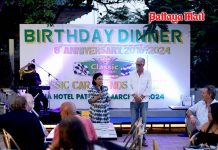Pattaya City Expats Club members and guests learn about the Chinese Taiping Rebellion, the 2nd bloodiest war in history, at their Sunday, December 8 meeting. The speaker was Dean Barrett, the well known author of over a dozen books with a Thailand or China theme. His latest book is “A Love Story: The China Memoirs of Thomas Rowley” which takes place during this period in China’s history.
An excerpt from a review of this novel notes it “… is written with impressive sensitivity and attention to detail… A story of doomed love that is both erotic and touching.” The novel is set against the backdrop of the Taiping Rebellion which was a massive civil war in southern China from 1850 to 1864; pitting the Taiping rebels against the ruling Manchu-led Qing Dynasty. The rebellion was led by Hong Xiuquan who claimed that he had received visions in which he learned that he was the younger brother of Jesus.
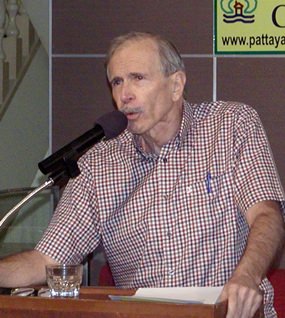 Pattaya City Expats Club was fortunate to have popular author Dean Barrett as guest speaker for their meeting on the 8th of December, with Dean’s topic being his new book ‘“A Love Story: The China Memoirs of Thomas Rowley”.
Pattaya City Expats Club was fortunate to have popular author Dean Barrett as guest speaker for their meeting on the 8th of December, with Dean’s topic being his new book ‘“A Love Story: The China Memoirs of Thomas Rowley”.
Between 20 and 40 million people died, mainly civilians, in one of the deadliest military conflicts in history. Only the Second World War had more casualties. Dean said that the Taiping Rebellion made the American Civil War look like a tea party. Dean explained that he became interested in the history of China when he was training as a Chinese linguist at the (U.S.) Army Security Agency in 1966. For this, he needed to understand what was happening during the cultural revolution in China, and that meant also knowing about Chinese history and culture going back a couple of centuries.
Hong Xiuquan established the Taiping Heavenly Kingdom with its capital at Nanjing. The Taiping army, which was largely a peasant army, controlled large parts of southern China – at one point ruling about 30 million people. The rebel agenda included social reforms such as shared property, equality for women, and the replacement of Confucianism, Buddhism and Chinese folk religion with their form of Christianity. Because of their refusal to wear the queue – a hairstyle favoured by the Manchu in which the hair is gathered up into a ponytail, often braided – Taiping combatants were nicknamed “longhairs” by the Qing government. The Qing forces besieged the Taiping armies throughout the rebellion and eventually crushed the army with the aid of French and British forces. (Actually, Dean said, there were foreigners fighting on both sides of the conflict.)
The Taipings were regarded as fanatics, while the Manchu were seen as corrupt, decadent and arrogant. Dean explained that civilians caught up in the fighting, as cities were conquered by one side and then re-conquered by the other, had a hard time knowing which hairstyle they should be wearing on a given day. Further, that this struggle has certain parallels to what is happening today in Thailand – the well off and the well educated in one camp versus the less well off and less well educated in the other.
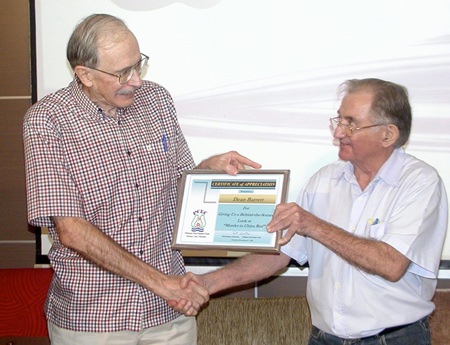 Board member Lawrie McLoughlin presents Dean with a Certificate of Appreciation as thanks for a very informative talk and a new and interesting subject for most of the audience.
Board member Lawrie McLoughlin presents Dean with a Certificate of Appreciation as thanks for a very informative talk and a new and interesting subject for most of the audience.
Many people thought that the Taiping forces would emerge victorious, but Dean mentioned that Hong Xiuquan paid more attention to his 100 concubines than he did to the conduct of the war. Although the Taiping rebels did not manage to win the war, they succeeded in loosening the Qing government’s control of the central areas of China. The Manchu dynasty hung on until 1911, but the cracks were already apparent.
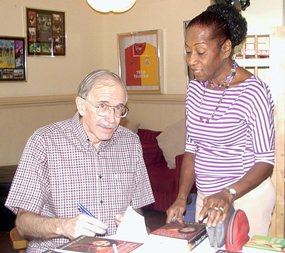 Dean autographs a copy of ‘Thomas Rowley’ for lucky PCEC member Janet Smith.
Dean autographs a copy of ‘Thomas Rowley’ for lucky PCEC member Janet Smith.
Dean said that the Taiping Museum in Nanjing is a very interesting place to visit. During his research for the novel, he learned that the Taiping forces had some all-female units and that the women were very tough fighters. He used that is his book. The protagonist, Thomas Rowley, a foreigner fighting on the Qing government side, is captured by such a unit. He thinks of escaping, but then falls in love with one of the women fighters. Eventually, there is a battle, and Rowley has to decide whether to fight with the women or fight with the Qing government forces.
Dean explained that he set up his novel to read like non-fiction. Dean, as the author, is shown as writing some notes at the beginning and at the end of the book, but the vast middle section is presented as being an old man’s memoirs that have just surfaced.
For people interested in learning more about the history and culture of this period in China, Dean recommended three books: (1) “The Devil Soldier” by Caleb Carr; (2) “God’s Chinese Son” by Jonathan D. Spence; and (3) “Autumn and the Heavenly Kingdom” by Stephen R. Platt. Dean also mentioned a two-volume work written in 1866 by Augustus Lindley, an English officer and supporter of the rebels. The title is “Ti-ping tien-kwoh.” The book is available free in e-book format (see http://www.gutenberg.org/ebooks/39735).
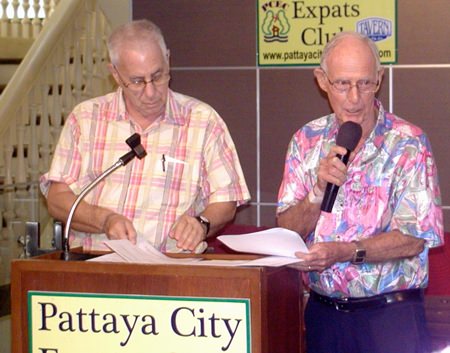 Board member Richard Smith advises members of the many activities in the Amari over the festive season.
Board member Richard Smith advises members of the many activities in the Amari over the festive season.
Dean Barrett is known for his humour as much as for his history-based mystery books. You can learn more about Dean, his mystery books, and his sense of humour by visiting these websites: http://www.dean barrettmystery.com/ and www. deanbarrettthailand.com/welcome_to.htm. For a more complete biography, visit http://www.authorsden.com /visit/author.asp?AuthorID=679




